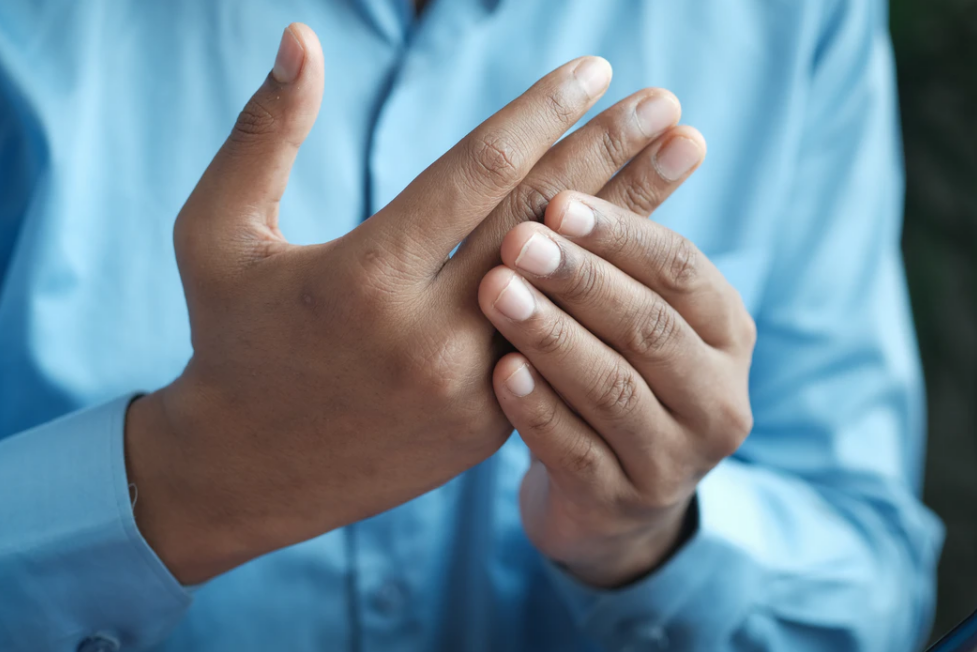Introduction:

Living with rheumatoid arthritis can be a constant battle against joint pain and discomfort. Among the various joints affected, the knee joint often becomes a primary source of agony for many individuals. However, finding effective pain relief solutions for knee joint issues caused by rheumatoid arthritis is essential to improve your quality of life. In this blog, we will explore tips, recommendations, and treatments to alleviate knee joint pain and enhance mobility.
Understanding Rheumatoid Arthritis:
Rheumatoid arthritis (RA) is an autoimmune disease that primarily affects the joints, causing pain, swelling, and stiffness. Inflammation associated with RA can gradually wear down cartilage, leading to joint damage and diminished mobility. To combat this, a comprehensive approach that includes pain management, exercise, and lifestyle modifications becomes crucial.
1. Pain Relief Solutions for Knee Joint:
a. Exercise and Physical Therapy:
Regular exercise, tailored to your specific condition, can significantly reduce pain and promote joint health. Low-impact activities such as swimming, cycling, and walking are ideal. Physical therapy, supervised by professionals, can provide targeted exercises to strengthen the muscles around the knee joint, ensuring better support and stability.
b. Heat and Cold Therapy:
Applying heat or cold to the affected knee joint can provide temporary relief. Heat therapy improves circulation and relaxes muscles, while cold therapy numbs the area, reducing inflammation and pain. Experiment with both methods to find what works best for you.
c. Proper Orthopedic Support:
Utilizing supportive braces or knee sleeves can provide stability and alleviate pressure on the knee joint. Consult with a healthcare professional or physical therapist for recommendations and guidance on selecting the appropriate support.
d. Topical Pain Relief:
Over-the-counter creams or ointments containing topical analgesics can provide localized relief. These products often contain ingredients such as capsaicin, menthol, or lidocaine, which temporarily desensitize nerve endings and reduce pain signals.
2. Pain Medications and Injections:
a. Nonsteroidal Anti-Inflammatory Drugs (NSAIDs):
NSAIDs like ibuprofen or naproxen sodium can help reduce pain and inflammation. However, long-term use of these medications may pose risks, so consult your healthcare provider to determine the appropriate dosage and duration for your specific needs.
b. Disease-Modifying Antirheumatic Drugs (DMARDs):
Prescribed by rheumatologists, DMARDs can slow the progression of rheumatoid arthritis, diminishing joint damage and alleviating pain. Biological DMARDs like adalimumab or etanercept may be recommended for severe cases.
c. Corticosteroid Injections:
Direct injections of corticosteroids into the knee joint can offer effective pain relief, often providing longer-lasting benefits compared to oral medications.
3. Lifestyle Modifications:
a. Maintaining a Healthy Weight:
Excess weight adds significant strain on the knee joint, exacerbating pain and inflammation. Weight management through a balanced diet and regular physical activity is essential.
b. Anti-Inflammatory Diet:
Incorporate foods rich in omega-3 fatty acids, such as fish, walnuts, and flaxseeds, which have natural anti-inflammatory properties. Additionally, limit or avoid foods that can promote inflammation, such as processed foods, refined sugars, and unhealthy fats.
c. Stress Management:
Stress can worsen inflammation and intensify pain. Engaging in stress-reducing activities like meditation, yoga, or deep breathing exercises can help manage pain levels.
Conclusion:
Effective pain relief solutions for knee joint problems caused by rheumatoid arthritis are essential to enhance mobility and improve overall well-being. By utilizing a combination of exercise, physical therapy, supportive braces, topical treatments, medications, and lifestyle modifications, you can mitigate pain and promote joint health. Remember to consult with your medical care provider for personalized recommendations and guidance. Embrace these strategies, and take control of your life by alleviating knee joint pain caused by rheumatoid arthritis.
Keywords: pain relief solutions, knee joint, rheumatoid arthritis, exercise, physical therapy, heat therapy, cold therapy, orthopedic support, topical pain relief, pain medications, injections, lifestyle modifications, healthy weight, anti-inflammatory diet, stress management.
